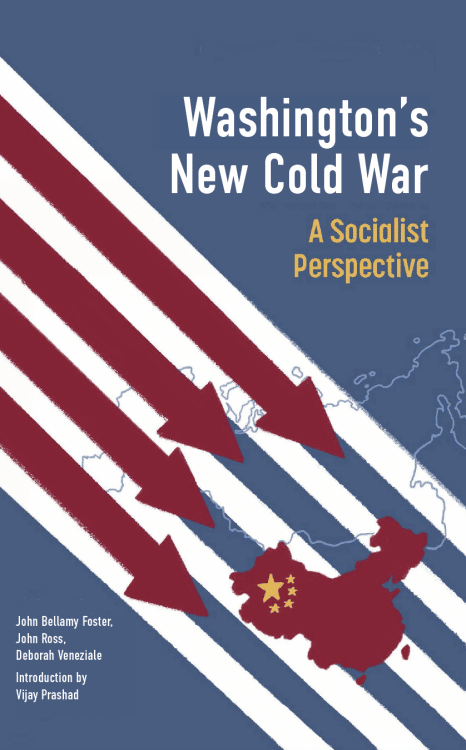Washington’s New Cold War
108 pages/ $15 paper / 978-1-68590-000-7
by John Bellamy Foster, John Ross, and Deborah Veneziale
With an introduction by Vijay Prashad
Reviewed by Seth Sandronksy for The Progressive Populist
The world system is shifting. Military tensions are rising. Uncle Sam is on the warpath. Mother Nature suffers.
What does this mean? John Bellamy Foster, John Ross, Deborah Veneziale and Vijay Prashad explain in Washington’s New Cold War: A Socialist Perspective.
The authors bury some illusions. One is that Uncle Sam has peaceful aims. US-led peace is a dead letter. War is a profit center. It overshadows all other concerns.
Former President Dwight Eisenhower’s take on the military-industrial complex as a threat to democracy rings true today. Enemies of Uncle Sam are the same now, as in the past century — China and Russia, formerly the USSR. What is old is new.
Well, not exactly. There is also the ecological crisis of rising oceans, melting glaciers, disappearing habitat, increasing droughts and pandemics. This is a partial list. We live in terrifying times as the prospects for nuclear war and climate collapse bring an urgency to find peaceful solutions.
Prashad brings an internationalist view to the book under review. “The aim here is therefore to present in a factual, objective, and calm way the reasons why the United States will attempt to further escalate its military aggression over the coming period,” he writes. Further, Prashad explores “which trends may serve to counteract this dangerous US policy and which may exacerbate it.”
Ross in part inters the ways that Uncle Sam pushed Russia into a war with neighboring Ukraine. The eastward expansion of NATO towards Russia is a major piece of this conflict-escalation. That is also a taboo topic in US mainstream media. Ross takes a deep dive into correcting the record.
What has changed in the old and new Cold Wars is the economic situation of the US with respect to China and the Global South. This is a challenge to Uncle Sam’s hegemony over the global system.
Veneziale unpacks the bipartisan form of belligerent US foreign policy. There are, as she writes, interweaving interests pushing war abroad. These interests pursue a set of tactics unfolding in real time, ranging from the cultural to financial, industrial and rhetorical.
Foster, academic, author and editor of Monthly Review, wraps up with a critique of Cold War 2.0 in light of the ecological harm underway as a risk of nuclear war between the US and/or China and Russia escalates. For example, he explores the implications of a nuclear exchange. It would harvest a nuclear winter of massive crop failures as people starve.
Foster further details US nuclear strategy. He reveals that Uncle Sam’s current drive for nuclear primacy is insane. Its root is a grow-or-die system.
“The causal agent in the two global existential crises now threatening the human species is the same: capitalism and its irrational quest for exponentially increasing capital accumulation and imperial power in a limited global environment,” Foster writes.
The path forward is clear, according to Foster. “The only possible response to this unlimited threat is a universal revolutionary movement rooted in both ecology and peace that turns away from the current systemic destruction of the Earth and its inhabitants and toward a world of substantive equality and ecological sustainability: namely, socialism.”
See this review at The Progressive Populist

Comments are closed.